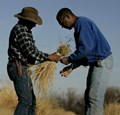
India has predominantly been an agricultural economy. From the golden plains of wheat in Punjab, the tea gardens of Darjeeling and the succulent paddy fields of Chhattisgarh and Coconut Plantations of Kerala, India is blessed with rich network of rivers and fertile soils.
In India, farmers are referred as the ‘Annadata’ or ‘the food provider’ out of respect, even the founding fathers of India understood the importance of farmers, due to which Lal Bahadur Shastri declared “Jai Jawan Jai Kisan” as the slogan of New India in 1965.
Still, the farmer of India is exploited to the very core by politicians, middlemen & other stakeholders in the agriculture supply chain. This is largely because Indian farmers are not aware of their rights and no one seems to educate them about it too.
Therefore, in this article, we going to discuss the various Rights that the farmers are entitled to.
Important Rights of a Farmer
Right to Land
Farmers across the country are being displaced to give way to factories, mines, dams, etc. But the farmers must know they have a fundamental right to land. The farm lands should be protected for social and environmental reasons and not be acquired for non- agricultural purposes. No agricultural land should be acquired without the farmer's consent and no agricultural land should be made available to multinational corporations.
Right to Conserve, Reproduce, and Modify Seed and Plant Material
Third World farmers are the original donors and custodians of most genetic resources which are the first link in the cycle of food production. Article 19 of the Indian Constitution gives every citizen the freedom to practise his/her occupation. Since the seed is the primary tool of agricultural production - the 'occupation' of farmers, the Article ensures the rights of farmers to produce, reproduce, modify and sell seed.
Farmers’ Right on Seeds
The farmers’ right on seeds is a traditional right enjoyed by farmers all along the history of agriculture. This right includes the right to save the seed from one’s crop and use the saved seed for sowing, exchanging, sharing or selling to other farmers. It is fundamental to the conservation role performed by farmers.
Farmers’ Right for Reward and Recognition
In recognition of the important role farmers have been playing for the conservation of varietal wealth of crop plants, the Protection of Plant Varieties & Farmer Rights Act has a provision to reward and recognize individual farmers or farming and tribal communities for such contribution.
Farmers’ Right to get Compensation for Crop Loss suffered
The primary purpose of registration of a plant variety Act is to establish exclusive commercial right on the variety. Commercial demand arises from the capability of the variety for better agronomic performance. Some of the seed companies, however, promote their seed by making exaggerated claims on the agronomic performance of their varieties. Farmers purchasing and cultivating such seeds may eventually realize the deceit.
Farmers’ Right for Benefit Sharing
The benefit sharing is one of the most important ingredients of the farmers' rights. Section 26 provides benefits sharing and the claims can be submitted by the citizens of India or firms or non-governmental organizations (NGOs) formed or established in India.
Depending upon the extent and nature of the use of genetic material of the claimant in the development of the variety along with commercial utility and demand in the market of the variety breeder will deposit the amount in the Gene Fund. The amount deposited will be paid to the claimant from National Gene Fund. The Authority also publishes the contents of the certificate in the PVJI for the purpose of inviting claims for benefits sharing.
Right to Safety and Health
The chemicalization of agriculture that has occurred since the Green Revolution has not been matched with a concomitant effort to protect the farmer or the consumer from the associated hazards much to their detriment. Farmers and consumers have a right to health and environmental safety standards.
Right to Participatory Research
Farmers have been the original agricultural innovators and have a right to continue this age-old tradition. In the public sector agricultural research has thus far not treated farmers as partners in research. Farmers have a basic right to innovate, create and participate in all research pertaining to agriculture. Democratization of research is necessary for the implementation of this right.
















